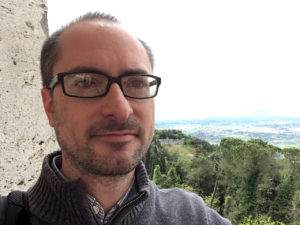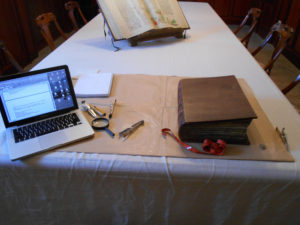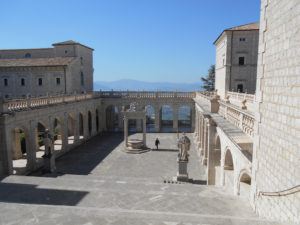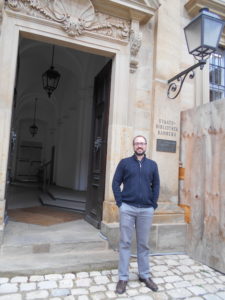On December 7, 2018, History Ph.D. candidate Jeffrey Doolittle gave a paper entitled “‘Efficassimum est Alexandrinum’: Drugs and Efficacy in Early Medieval Latin Pharmacology” at the “Drugs in the Medieval World, ca. 1050-ca. 1400” conference held at the Strand Campus of King’s College London. This two-day conference, organized by Dionysios Stathakopoulos and Petros Bouras-Vallianatos, featured papers on the transcultural transmission of information about materia medica (medical ingredients) during the middle ages and brought together some of the best scholars working on medical texts in Greek, Latin, Syriac, Hebrew, Arabic, Persian, Turkish, and Tibetan sources.
Jeffrey’s paper analyzed the growing connections between drugs, geography and efficacy in a series of related recipe collections in Latin which were extracted from the medical portions of Pliny the Elder’s Natural History. Focusing on a set of dental recipes and their subtle changes from manuscript to manuscript, Jeffrey noted that the ninth century marked a dramatic increase in the complexity and precision of new recipes added to older collections. These ninth-century recipe additions also showed a proliferation of the ingredients they required, along with a significant expansion of the medical applications of ingredients sourced from distant regions. These discoveries reflect a subtle rethinking of Pliny’s works along with the spread of new medical assumptions about particular substances and their places of provenance. The papers delivered at the conference are to be published in a forthcoming volume.
Tag Archives: jeff doolittle
Postcard: Hello from King’s College
Comments Off on Postcard: Hello from King’s College
Filed under Grad Student News, Postcards
Grad Student Publications, A Summer Series: Pt. 4 Jeff Doolittle
Students in Fordham’s MA and PhD programs produce original research of the highest quality, and are encouraged to publish this work when and where it is appropriate during their time in the program. The academic year 2016-2017 saw the appearance of articles by a number of our students in different peer-reviewed volumes and journals. We asked our students who published their work to tell us a little bit about the articles and the writing process and we’ll feature these students and their publications in a short blog series.
This week we report on an article published this past year by History PhD student Jeffrey Doolittle. We recently heard about Jeff Doolittle’s adventures in the archives at the abbey of Montecassino in Italy, where he has been researching medical manuscripts on the earlier middle ages. His article, however, tackles a very different question in a much later period. Entitled “Charlemagne in Girona: Liturgy, Legend and the Memory of Siege” it addresses a liturgy composed for the emperor Charlemagne that was written in a fourteenth-century manuscript. The article was published in The Charlemagne Legend in Medieval Latin Texts, ed. William J. Purkis and Matthew Gabriele, pp. 115-47. Cambridge: D.S. Brewer, 2016.
Jeff wrote to us to describe the process of writing and revising the article:
This article has certainly changed a lot since it began as a seminar paper in Dr. Nicholas Paul’s graduate course on the crusades some six long years ago! In its published form, part of an edited volume by William Purkis and Matthew Gabriele on the Latin legends of Charlemagne, my article provides a brief overview of the cult of St. Charlemagne in Girona, Spain, which was celebrated in the cathedral of the city from the middle of the fourteenth century up until its suppression in the late fifteenth century. Central to Girona’s unique liturgical office was a narrative of Charlemagne’s role as a liberator of the city from the Muslims in the context of a dramatic siege, ultimately aided by the miraculous intercession of Mary. To make matters more interesting, there were no indications from other sources that Charlemagne himself had ever stepped foot in Girona nor had directed any attack against the city; the tradition seems to have been a later medieval development. I focus on the narrative of siege in the article, and argue that the fourteenth-century liturgy’s emphasis on Charlemagne’s imaginary siege of Girona and his triumph should be read against the much more recent and traumatic siege, also at the hands of a French crusading king from the north during the Crusade against Aragon (1284-5), where Girona was also the victim. This project has taken a long journey as it has transformed with Dr. Paul’s help from an inchoate seminar paper to a more focused conference paper given at the International Medieval Conference at a session organized by Drs. Purkis and Gabriele, and finally to a published contribution in their volume. Above all, I am grateful for the guidance and constructive comments at each juncture from many people, all of which helped effect this transformation.
Comments Off on Grad Student Publications, A Summer Series: Pt. 4 Jeff Doolittle
Filed under Grad Student News, Publications
Postcard from the Archives: Jeffrey Doolittle
We received a postcard from PhD student Jeffrey Doolittle updating us on his year as a Fordham University GSAS Research Fellow:
Throughout this past spring, I have been happily ensconced in Italy conducting research for my dissertation. I am currently exploring the medical culture of the Benedictine abbey of Montecassino in the ninth-century through a study of one of its products, Archivio dell’Abbazia, Codex 69, a project that requires an extensive codicological and paleographical analysis of a small corpus of manuscripts written in the Beneventan script. Thanks to a GSAS Research Fellowship, I was able to visit a number of archives in Northern Europe last fall; this spring and summer, I spent most of my time in Cassino researching at the Archivio dell’Abbazia of Montecassino under the patient guidance of the archivist, Don Mariano Dell’Omo. St. Benedict’s famous monastery, of course, is located at the top of a mountain, and the archive is also only open in the morning when buses do not run. So I woke up especially early and hiked up every day, a trip that ordinarily took about 1.5 hours. Fortunately, and in the spirit of Benedictine moderation, I did not have to walk both ways; there was a bus to come back down.
When not at the Archive, I was able to make use of the resources of the “Laboratorio per lo studio del libro antico” at Università degli Studi di Cassino e del Lazio Meridionale and its incredible digital library of medieval manuscripts, and I remain especially thankful for the expertise and kind assistance of the curators of the laboratory, Drs. Lidia Buono, Eugenia Russo and Stella Migliorino. Using Cassino as a base, I have also been able to visit the Biblioteca Medicea Laurenziana (Florence), the Biblioteca Casanatense (Rome), the Biblioteca Apostolica Vaticana (Vatican City) and the Biblioteca Nazionale in Naples.
Since July 1, I have moved on to the United Kingdom where I will deliver a paper at the International Medieval Congress at Leeds. I will also visit a few additional archives in the UK and Ireland including the Hunter Library in Glasgow, before returning home by the end of July.
Thanks for the postcard, Jeff. We look forward to seeing you when you’re back and hearing more about your research and archival discoveries.
Comments Off on Postcard from the Archives: Jeffrey Doolittle
Filed under Grad Student News, Postcards
Six Weeks, Four Countries, Five Libraries: The Research Adventures of Jeffrey Doolittle
With funding provided by a GSAS Research Fellowship, graduate student Jeffrey Doolittle has been able to spend six and a half weeks this autumn at five research libraries in Europe working with several Beneventan manuscripts that will be integral to his dissertation.
Jeffrey’s project explores the medical monastic culture of the early medieval Benedictine abbey of Montecassino through a study of one of its products, Archivio dell’Abbazia, cod. 69, a compendious manuscript produced in the late ninth century. Part of his project entails an extensive codicological and paleographical analysis of Montecassino 69 in comparison with other early medieval manuscripts written in the Beneventan script. So, in order to collect the data for this portion of his dissertation, Jeffrey has traveled to study manuscripts in the collections of the Universiteitsbibliotheek Leiden (the Netherlands), Det Kongelige Bibliotek (Copenhagen, Denmark), and the Staatsbibliothek Bamberg (Bamberg, Germany). And over the next few weeks, he will make two more stops at the Bayerische Staatsbibliothek in Munich and finally the Österreichische Nationalbibliothek in Vienna, all before the holiday break! Through the course of this journey, he will study a total of eleven manuscripts. So far, the trip has been extraordinarily productive and rewarding, and Jeffrey has enjoyed conversations with the wonderfully friendly librarians and specialists, including Erik Petersen in Copenhagen and Stefan Knoch in Bamberg. Still, he looks forward to returning home to his family for the holidays, and preparing for another research trip to Italy in the spring!
Comments Off on Six Weeks, Four Countries, Five Libraries: The Research Adventures of Jeffrey Doolittle
Filed under Grad Student News, Postcards





